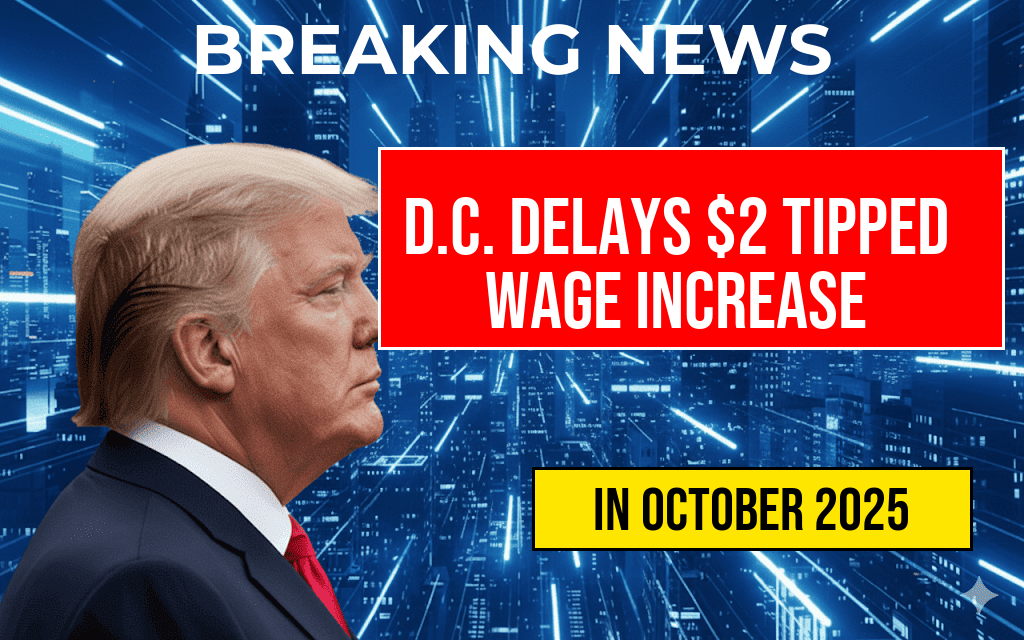The minimum wage landscape in Washington D.C. is undergoing significant changes as the city grapples with the implications of a $17.95 minimum wage and the complexities surrounding tip credit regulations. Employers in the District are now faced with understanding the nuances between these two wage structures as they adapt to the evolving legal framework. The $0 difference between the minimum wage and the tip credit system has sparked debates about fair compensation for service workers amidst rising living costs. This article delves into the critical aspects of the $17.95 minimum wage, the role of tip credits, and what employers must know to remain compliant and competitive in the D.C. labor market.
Understanding the Minimum Wage in D.C.
As of July 1, 2022, Washington D.C. enacted a new minimum wage of $17.95 per hour, marking one of the highest minimum wage rates in the United States. This increase is part of a broader initiative to ensure livable wages for workers, particularly in a city known for its high cost of living. The law applies to most employers, but there are specific provisions regarding the use of tip credits that employers must navigate.
The Role of Tip Credit
Tip credit allows employers to pay a lower base wage to employees in service industries—like restaurants and bars—provided that tips received make up the difference to meet the minimum wage requirement. In D.C., the current tip credit is set at $5.55, which means employers can pay tipped employees as little as $12.40 per hour, assuming tips bring their total earnings to at least $17.95.
Comparison of Minimum Wage and Tip Credit
| Category | Minimum Wage | Tip Credit | Effective Hourly Rate |
|---|---|---|---|
| Standard Minimum Wage | $17.95 | N/A | $17.95 |
| Tipped Employees | $12.40 | $5.55 | $17.95 (with tips) |
Implications for Employers
Employers must ensure compliance with the minimum wage law while effectively managing their labor costs. Misunderstandings about the tip credit system can lead to significant financial penalties. Businesses need to track tips accurately and maintain proper records to demonstrate compliance with wage laws. Failing to do so can result in wage theft claims, which can be costly both financially and reputationally.
Compliance Strategies
- Educate Management and Staff: Training programs can help ensure that all employees understand how wages and tips work under the law.
- Maintain Accurate Records: Keep detailed records of hours worked, tips received, and wages paid to meet legal requirements.
- Regular Audits: Conduct periodic audits of payroll practices to ensure compliance with D.C. wage laws.
Impact on Workers
For employees, understanding the $0 difference between the minimum wage and the tip credit can significantly impact their earnings. While the minimum wage provides a safety net, the tip system can offer opportunities for higher income in service roles, particularly in busy establishments. However, reliance on tips can lead to income variability, making it crucial for workers to understand how their earnings are structured.
Challenges for Tipped Workers
While the tip credit allows for lower base wages, it also introduces uncertainty for many workers. The fluctuation in tips due to seasonality, economic downturns, or changes in customer behavior can affect overall income stability. Advocacy groups argue for a reevaluation of the tip credit system to ensure that all workers receive a fair wage without the reliance on tips.
Conclusion
The evolving wage landscape in Washington D.C. highlights the need for both employers and employees to understand the intricacies of minimum wage laws and tip credits. As the city continues to advocate for fair wages, the implications of these regulations will be felt across various industries. Employers need to stay informed and compliant, while workers must navigate their rights and compensation structures effectively.
For more information on D.C. minimum wage laws, visit the D.C. Register or consult resources from U.S. Department of Labor.
Frequently Asked Questions
What is the $0 difference in the context of D.C. wages?
The $0 difference refers to the gap between the tip credit and the $17.95 minimum wage mandated for employers in Washington D.C. Employers can use tips to offset the minimum wage they pay to employees, resulting in a potential wage of $0 if not managed properly.
How does the tip credit system work in D.C.?
In D.C., the tip credit allows employers to pay a lower base wage to employees who receive tips, as long as their total earnings (base wage plus tips) meet or exceed the minimum wage of $17.95. Employers must ensure that tips sufficiently cover the difference between the base wage and the minimum wage.
What are the implications for employers regarding the minimum wage?
Employers in D.C. must ensure compliance with the $17.95 minimum wage, which means they cannot simply rely on tips to compensate employees. If tips do not bring an employee’s total earnings to the minimum wage, the employer is required to make up the difference.
What should employees know about their rights under the tip credit system?
Employees should be aware that they are entitled to receive at least the minimum wage of $17.95 when combining their base pay and tips. If they do not reach this amount through tips, they have the right to request the additional compensation from their employer.
Are there any exceptions to the tip credit policy in D.C.?
Yes, certain exceptions apply. For example, not all employees in the service industry may qualify for the tip credit. Employers should verify the specific criteria and exemptions to ensure they are complying with D.C. wage laws.






